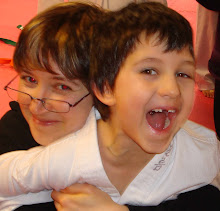A murder at the Louvre throws together an American professor and a Parisian cryptologist. Pursued by the authorities and by members of a religious sect, they explore parts of Paris and London on a quest to unravel a series of clues left behind by the murdered man.
"Pay no attention to the man behind the curtain..."
I'm sorry to say that for me, this book did not live up to the avid recommendations that have come my way over the past year. The premise of the book was interesting enough, though it bears more than a tiny resemblance to the movie "National Treasure," which I saw recently enough that I kept picturing Nicolas Cage as I read. As a matter of fact, Cage's woeful "acting" is a great parallel for the author's lowest-common-denominator writing style - describing absolutely everything in simplistic terms, leaving nothing to the reader's imagination (including superfluous details such as what type of engine a plane had and the processing speed of a computer doing a document search) was so distracting that I couldn't really suspend disbelief and just enjoy the story, however implausible. Brown's love of explanations also made this book far too heavy on exposition - either he or the main character, Robert Langdon, spent at least half of this book expounding endless theories (which are presented as fact), without nearly enough action to balance out this weighty theorizing.
Speaking of Langdon, I was pretty sick of him by the end of the first couple of chapters. Here is a man whose extensive knowledge is constantly amazing, shocking, astounding, overwhelming and stunning the people around him, while he grins (or, for variety, smiles) as he pontificates to everyone from prison inmates to unrealistically engaged college students, and of course, to his naive sidekick, cryptologist Sophie Neveu - who in spite of being a brilliant woman, with impressive responsibilities and academic credentials, is very much shocked, stunned, overwhelmed, etc by almost every "amazing" fact or historical detail that spouts out of Langdon's mouth. But wait, there's still more! Part way through the book, Langdon recruits yet another sidekick, the roguish Sir Leigh Teabing, who just happens to live near Paris, and just happens to also be able to spout great amounts of knowledge about the very subjects that Langdon and Neveu most need to know about, always with a twinkle in his eye and endless money at his disposal (fear not, we are treated to many expository passages to make it clear just *exactly* how Teabing has spent his inherited funds).
I did manage to make it to the end of the book. What's left in my mind is one pressing question: What *is* it about this story that has made this book such a bestseller and has led thousands of tourists to visit the sites that are mentioned in it? Whatever that is, it certainly escaped me. Can I have my twelve dollars back now?
Subscribe to:
Post Comments (Atom)

4 comments:
Sorry - I had a duh moment there.
Good Review!
I didn't much like the book either.
http://hmsindefatigable.blogspot.com/2005/03/da-vinci-code.html
Vindication from none other than Margaret Cannon, crime book reviewer for The Globe and Mail.
"Okay, I confess. I hated The Da Vinci Code. I hated its spurious blend of bad religion and poor history. I hated its "hidden secret knowledge" plot. I thought the characters were wooden and the premise tiresome."
(from the Crime Books column, Sat 24 Dec 2005).
And now... Dan Brown reveals just how formulaic his crap "thrillers" are!
http://www.slate.com/id/2138483/nav/tap1/
Post a Comment